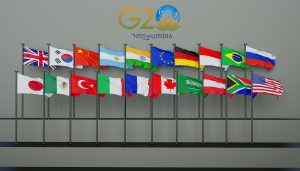The G-20 continues to be rocked by deep divisions. The Russia-Ukraine war has presented it with the biggest test yet. This weekend’s summit in New Delhi showcases the great power politics pulling and pushing the grouping in different directions, as the Global South’s middle powers continue to demand reforms to the current global order.
U.S. President Joe Biden will be at the summit, along with most of the other invited leaders. As expected, Russian President Vladimir Putin will not be there – he was absent at the last G-20 summit in Bali, Indonesia as well. More importantly, Chinese President Xi Jinping has also decided to miss it and will send Premier Li Qiang in his place.
Xi’s decision may be due to persistent tensions between New Delhi and Beijing. India continues to see Chinese military intrusions along the disputed border as the major barrier to good relations, while China wants India to address what it considers to be broader issues in their relationship, which include India’s growing proximity to the United States. A bilateral meeting between Indian Prime Minister Narendra Modi – this year’s G-20 host – and Xi at the recent BRICS summit in Johannesburg does not appear to have allayed differences very much. The overall chill clearly contributed to India converting this year’s summit of the Shanghai Cooperation Organization into a shorter, virtual affair.
China-U.S. ties, however, have improved somewhat, with a series of senior U.S. officials visiting Beijing over the summer. But these visits have not been reciprocated, and Washington’s moves to bind the Philippines, South Korea, and Japan even deeper into China-countering security strategies has not gone down well in Beijing.
Justified as it might be for Xi to believe that this is an inopportune time to encounter either Modi or Biden, his decision to skip the G-20 summit is, nonetheless, regrettable. His non-attendance sends the wrong signal and looks especially churlish coming from a great power. The G-20 should not be a venue to settle bilateral scores, but to insulate such matters from the more urgent task of tackling common challenges, of which there are no shortages these days.
The necessity of insulating one’s grievances with one or more G-20 members from the group’s broader agenda also extends to the raucous debates on the Ukraine war. Here the United States and its partners are among those unfortunately holding up progress. They are insisting on a blanket condemnation of Russia by all in the room.
However, most of the Global South, including South and Southeast Asian countries, sees this war very differently from the West. The Global South makes the perfectly reasonable argument that the G-20’s fundamental focus has historically been on economic governance, and matters should stay that way. The declaration from the Johannesburg BRICS summit is a good indicator of what these states see as important. The contrast is sharp with the G-7’s own statement at its recent Hiroshima summit.
The G-20 is the one compact forum in which the North and the South, East and the West have the opportunity to have a meaningful conversation that could lead to collective solutions. The recent success in restructuring Zambia’s debt was in no small measure due to the G-20’s Common Framework initiative for debt relief. G-20 leaders also appear to be forging a consensus on inviting the African Union to join their club.
In New Delhi, Biden is also expected to pitch a developmental agenda to Global South states, including greater support for Multilateral Development Bank (MDB) reform. The United States and India have collaborated in setting up an experts’ group, which recently issued a report recommending an additional $260 billion of development financing by MDBs by 2030. This proposal is not ambitious enough, but it is, nevertheless, a start.
These signs of progress shouldn’t fool us, however – the G-20 remains in a precarious state. The 2022 Bali summit rather miraculously produced a joint statement, largely due to Indonesia’s skillful hosting and mediation. This year, the divides have become even harsher, and a joint statement looks like a remote prospect. If one doesn’t materialize, it would be a regrettable first in the G-20’s history.
As the G-20 gets increasingly balkanized, four groups within it can be identified. G-7 states (as well as the EU, which is represented separately within G-20) have gelled as a bloc ranged against a recalcitrant Russia. Australia is clearly in the G-7’s camp, while China strongly tilts toward Russia. Six Global South states – Brazil, South Africa, Indonesia, Saudi Arabia, Turkey, and Argentina – have a very different perspective of the centrality of the “great power competition” and seek to avoid getting dragged into its sewers. Three straddlers with more complex interests to varying degrees include this year’s host India, Mexico, and South Korea.
With no end to the Ukraine war in sight, and the sharp China-U.S. rivalry continuing to destabilize the Asian and global order, it may fall upon these latter nine states to hold the G-20 together in New Delhi and beyond. They have their work cut out for them. Global problems don’t come with a pause button.

































